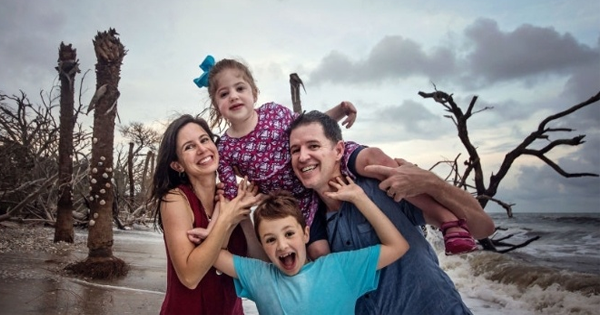Advertisement
When Glenn and Cara O’Neill learned that their daughter, Eliza, had Sanfilippo syndrome, they were told that their daughter would only be considered a viable patient for the trial treatment if she remained in isolation until the moment of treatment.
Glenn and Cara saw no other choice. They, their daughter, as well as their then-seven-year-old son, Beckham, went into “self-induced isolation” for 454 days: one year, two months, and three weeks.
At that point, the family were hopeful that Eliza’s trial treatment would soon be coming around the corner.
Then ended up staying in isolation for another 272 days.
Eliza’s disease, Sanfilippo syndrome, is an autoimmune condition of the metabolic system. Her body cannot properly digest sugar molecules in the body, and their body slowly begins to change in response. Facial dysmorphism may become noticeable, as well as behavioral issues.
For the O’Neill family, it wasn’t Eliza’s condition that made their isolation difficult. “[They] had no way of knowing when the trial would start, and when it did, if [Eliza] would be picked. The longer [the isolation] went, the crazier it became.”
Finally, in April 2016, the O’Neill family received the phone call they’d been waiting for. Eliza was eligible to participate in the clinical trial and would be pre-screened soon.

Beckham was sent to live with his grandparents as the O’Neill parents accompanied Eliza in continued isolation – until they got the all clear to take her to be pre-screened at the hospital.
The doctors would have to ensure that Eliza hadn’t developed any antibodies to a particular virus (the AAV9); any antibodies present in her immune system would attack the treatment they would administer, thereby making the medicine useless.
One month later, in May, Eliza had passed the screening test.
She would be able to receive treatment in a week’s time.
Glenn said of the experience, "It's a pretty awesome feeling, to go from knowing that with every second, with every breath your child is fading away, to then know that maybe this disease is now stopping in her.
"We don't know where it's headed, but before the treatment pain, suffering, degeneration, wheelchairs, feeding tubes and, eventually, death were her certain future. Now her future is uncertain, and that's an amazing thing."
After receiving her first treatment, Eliza was deemed safe to leave isolation. She and her parents have finally resumed their everyday lives – going to the grocery store, living around people.
Glenn and Cara continue to be hopeful for Eliza’s future, and they have since begun an organization – Cure Sanfilippo Foundation – to offer support to other parents whose children are also suffering from this rare disease.





